This hasselback butternut squash with pomegranate and tahini is the side dish that steals the show at every holiday table. Sweet, savory, stunning—and surprisingly easy to make.
But here’s what I love most: it tastes even better than it looks. Sweet roasted squash meets rich brown butter, salty pancetta, tart pomegranate bursts, and that silky tahini finish. Every bite is a perfect balance of sweet, savory, tangy, and nutty. And despite looking like something from a fancy restaurant, it’s surprisingly simple to make. The hasselback technique might seem intimidating, but I promise—once you try the chopstick trick, you’ll wonder why you were ever worried.
Why You’ll Love This Hasselback Butternut Squash Recipe
- It’s a total showstopper. The presentation is absolutely stunning—those accordion cuts, the vibrant colors, the elegant drizzles. This is the dish people photograph before they eat it.
- The flavors are perfectly balanced. Sweet butternut squash, nutty brown butter with crispy sage, salty pancetta, bright pomegranate, and creamy tahini—every element works together beautifully. This isn’t just roasted squash; it’s a flavor experience.
- You can make it ahead. Slice the squash the day before, keep it covered in the fridge, and roast it day-of. Less stress, more time with family—exactly what Thanksgiving should be.
- It works for everyone. Skip the pancetta for vegetarians, and it’s naturally gluten-free. Whether you serve it as a side or a vegetarian main, it holds its own beautifully.
What You’ll Need
For the Roasted Butternut Squash
- Butternut squash – Medium-sized squash (about 2-3 pounds each) with long necks work best. Look for squash that feels heavy for its size with smooth, unblemished skin.
- Olive oil – Helps the squash caramelize and develop those crispy, golden edges.
- Sea salt and black pepper – Essential for bringing out the natural sweetness of the squash.
- Smoked paprika – Adds subtle smokiness and gorgeous color.
- Garlic – Minced and brushed onto the squash, it becomes sweet and mellow as it roasts.
For the Sage Brown Butter
- Unsalted butter – As it browns, it develops an incredible nutty, toasty flavor that’s absolutely divine with squash.
- Fresh sage leaves – These crisp up beautifully in the brown butter and add that earthy, autumnal flavor. Fresh is essential here.
- Garlic – Thinly sliced for the brown butter, these little garlic chips turn golden and sweet.
- Red pepper flakes – Just a pinch adds subtle warmth that balances all the sweetness.
For the Toppings
- Pancetta – Italian cured pork that crisps up and adds incredible salty, savory crunch. Bacon works as a substitute.
- Pomegranate seeds – These jewel-like seeds burst with sweet-tart juice and add gorgeous color.
- Pine nuts – Toasted until golden for a delicate, buttery crunch.
- Fresh sage leaves – For garnish and a pop of color.
- Pomegranate molasses – A thick, tangy-sweet syrup that’s a Middle Eastern staple. It adds incredible depth.
- Tahini – Thinned with water and lemon juice for a creamy, nutty drizzle.
How to Cut Hasselback Butternut Squash (The Easy Way)
Here’s my foolproof method that makes this technique completely approachable:
The Chopstick Trick: Place two chopsticks (or wooden spoons) lengthwise on either side of your squash half. When you slice down, the knife hits the chopsticks before it reaches the cutting board, preventing you from cutting all the way through. It’s genius, and it works every single time.
Step-by-Step:
- Cut your peeled butternut squash in half lengthwise and scoop out the seeds
- Place one squash half, cut-side down, on your cutting board
- Position a chopstick on each long side of the squash
- Using a sharp knife, make cuts about ¼-inch apart across the width of the squash, slicing down until your knife hits the chopsticks
- Don’t worry if a slice or two goes all the way through—it still roasts beautifully and tastes delicious
Pro Tip: Make sure your knife is sharp. A dull knife makes this harder and less safe. And take your time with those first few cuts until you get the feel for it. The beauty of this technique is that even if your cuts aren’t perfectly even, it still looks impressive. I promise, you’ve got this.
Tips & Variations
Make-Ahead
- Prep the squash a day ahead: This is my favorite time-saving trick for Thanksgiving. You can peel, halve, and hasselback the squash the day before. Just cover it tightly with plastic wrap and keep it in the refrigerator. Bring it to room temperature (about 30 minutes on the counter) before roasting so it cooks evenly. The squash might darken slightly where it’s exposed to air, but that’s completely normal and won’t affect the flavor.
- Brown butter keeps well: You can make the sage brown butter up to 2 days ahead. Store it in an airtight container in the fridge, then gently reheat it in a small saucepan before drizzling. The sage leaves will lose some crispness when refrigerated, but they’ll still taste delicious.
- Crisp the pancetta ahead: Cook the pancetta up to a day in advance and store it in the fridge. Just give it a quick reheat in a dry skillet before serving to bring back that crispy texture.
Vegetarian & Vegan Options
- Skip the pancetta: For a vegetarian version, simply leave out the pancetta and add extra toasted nuts—pine nuts, walnuts, or pecans all work beautifully. You could also add crispy chickpeas for a different kind of crunch.
- Make it vegan: Use vegan butter for the brown butter (though it won’t brown quite the same way—look for golden color and nutty aroma), skip the pancetta and cheese, and you’ve got a stunning vegan side dish that still tastes incredible.
Ingredient Substitutions
- No pomegranate molasses? You can make a quick substitute by simmering ½ cup pomegranate juice with 1 tablespoon honey or maple syrup until it’s reduced by half and syrupy. It won’t have quite the same depth, but it works in a pinch. You could also use a good balsamic glaze.
- Can’t find pancetta? Thick-cut bacon works great. You could also use prosciutto (add it at the very end so it doesn’t overcook) or even crispy chorizo for a Spanish twist.
- Pomegranate seeds out of season? Dried cranberries soaked in warm water for 10 minutes make a nice substitute. They’ll give you sweetness and a pop of color, though you’ll miss that fresh juice burst.
- Different nuts: Pistachios, walnuts, or pecans all work beautifully in place of pine nuts. Toast them the same way for the best flavor.
- Try different herbs: While sage is classic with butternut squash, you can use fresh thyme or rosemary instead. Use about 2 tablespoons of fresh thyme leaves or 1 tablespoon of fresh rosemary (chopped). The flavor will be different but equally delicious.
- Mix it up: Use half sage and half thyme for a more complex herb flavor.
Common Questions Answered
- What if I cut all the way through? Don’t worry—I promise it still tastes just as good! If a slice or two separates, just nestle them back into place on the squash when you arrange it on the baking sheet. Once it’s roasted and topped with all those delicious ingredients, no one will notice.
- How do I know when the squash is done? The squash should be completely tender when pierced with a fork or knife, and the edges should be golden brown and slightly crispy. If the edges are browning too quickly but the squash isn’t tender yet, tent it loosely with foil and continue roasting.
- My squash is browning unevenly: Rotate your baking sheet halfway through cooking. If one end is cooking faster, that’s normal—every oven has hot spots. Just keep an eye on it and tent any parts that are getting too dark with a small piece of foil.
- Can I use pre-cut butternut squash? Unfortunately, pre-cut cubed squash won’t work for this recipe since you need the intact halves for the hasselback technique. But if you find pre-peeled whole squash at the store, that’s a great time-saver!
- The brown butter is smoking: Take it off the heat immediately. Brown butter can go from perfect to burnt very quickly. Use a light-colored pan so you can see the color change, and watch it carefully. It should smell nutty and toasty, not acrid.
Delicious Ways to Use Leftovers
- Toss with pasta: Chop up the leftover squash and toss it with cooked pasta (farro or orzo work beautifully too). Add a splash of pasta water to loosen everything, and you’ve got an incredible next-day lunch.
- Add to grain bowls: Dice the squash and add it to quinoa or farro bowls with fresh greens and extra tahini dressing.
- Make a frittata: Chop the squash and fold it into eggs with some cheese for a delicious breakfast or brunch dish.
- Stuff into flatbread: Warm pita or naan, spread with hummus, add chopped squash, and top with fresh greens for an easy sandwich
Serving Suggestions
This hasselback butternut squash is the showstopper your Thanksgiving table needs. Serve it alongside your roasted turkey, creamy mashed potatoes, and homemade gravy for a holiday spread that’s both traditional and memorable. The sweet-savory flavors and stunning presentation make it the side dish everyone talks about.
For a complete Mediterranean feast, pair it with homemade hummus, warm pita bread, and a fresh Greek salad. It’s also substantial enough to serve as a vegetarian main course—just give each person one squash half with a side of roasted vegetables, or a big green salad. And don’t forget, those leftovers are incredible chopped up and tossed with pasta or farro the next day.
Step-by-Step Instructions
Prepare the Butternut Squash
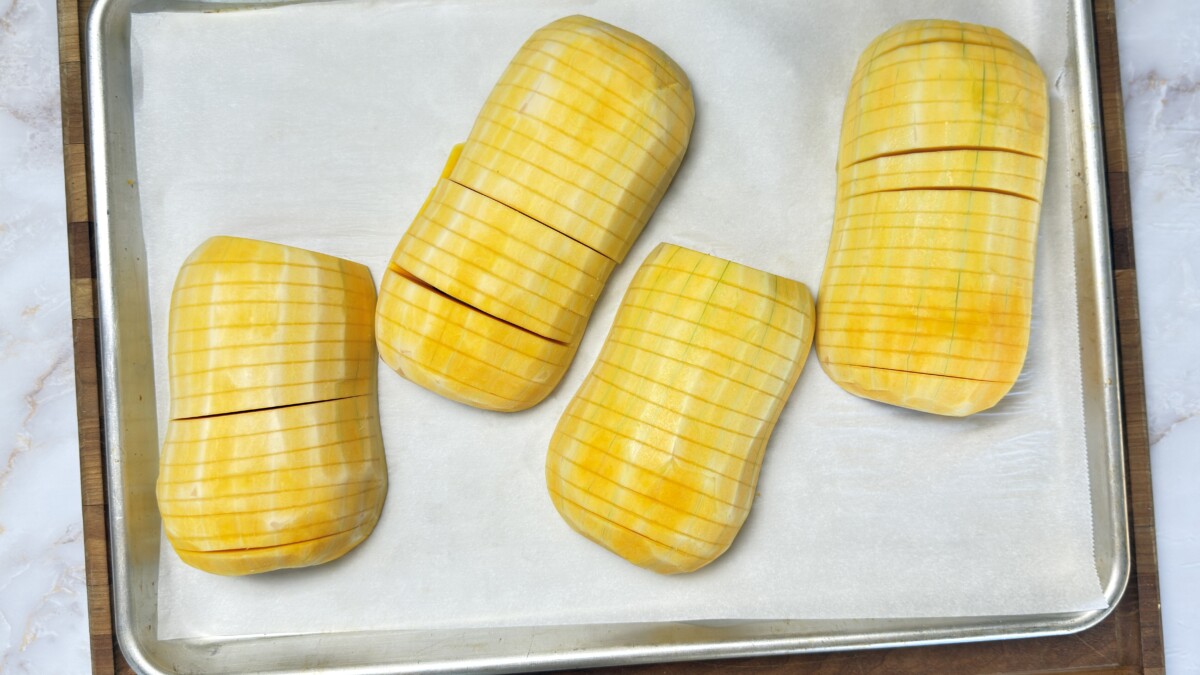
Cut and hasselback your squash following the technique I described earlier in the "How to Cut Hasselback Butternut Squash" section. You'll have four beautiful squash halves with those accordion cuts. Remember to use the chopstick trick— I used metal straws, it really works!
Pro Tip: If your squash is rolling around on the cutting board, place a damp kitchen towel underneath to keep it stable while you cut.
Season the Squash
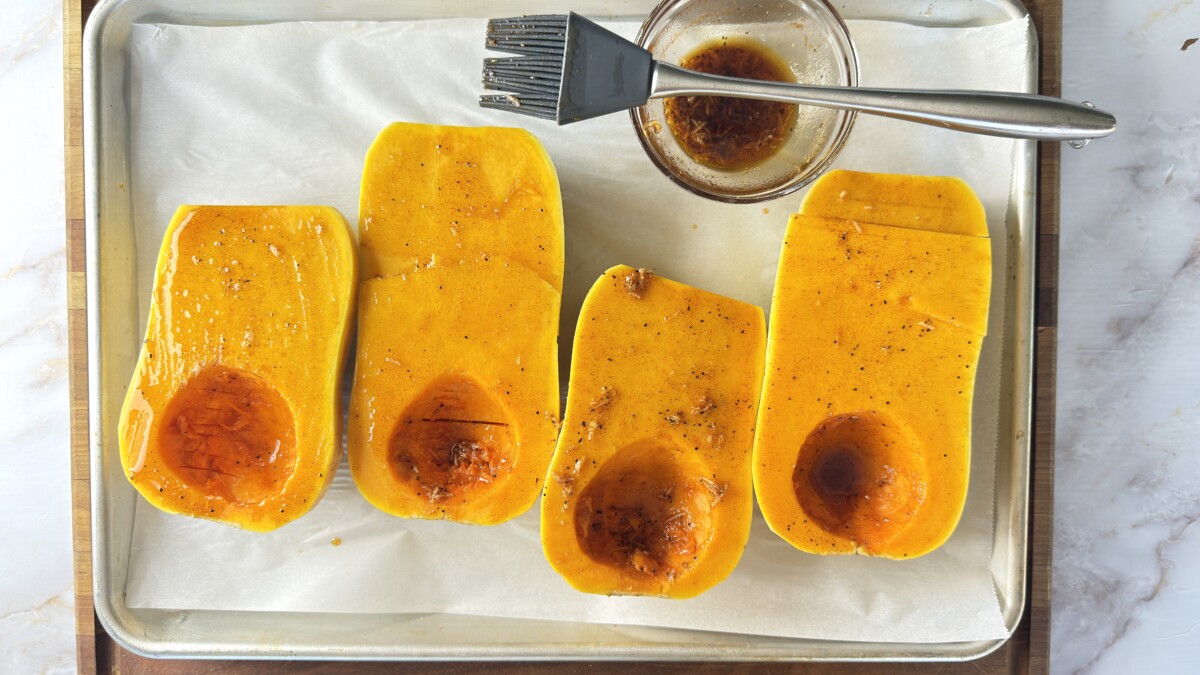
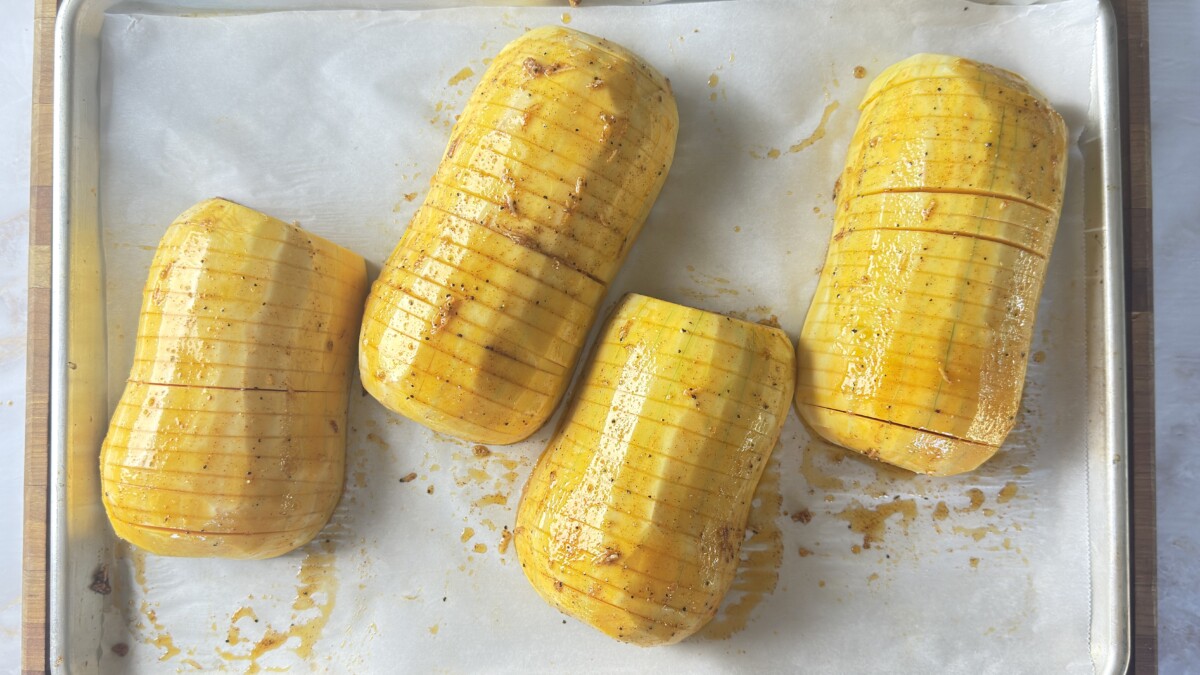
Brush generously. Using a pastry brush, brush the seasoned oil all over the squash—both sides. Don't be shy here! Make sure to get the mixture between those slices.
Arrange on the baking sheet. Place the squash halves on your prepared baking sheet, cut-side up. Make sure there's a little space between each half so the air can circulate and they roast evenly.
Roast the Squash
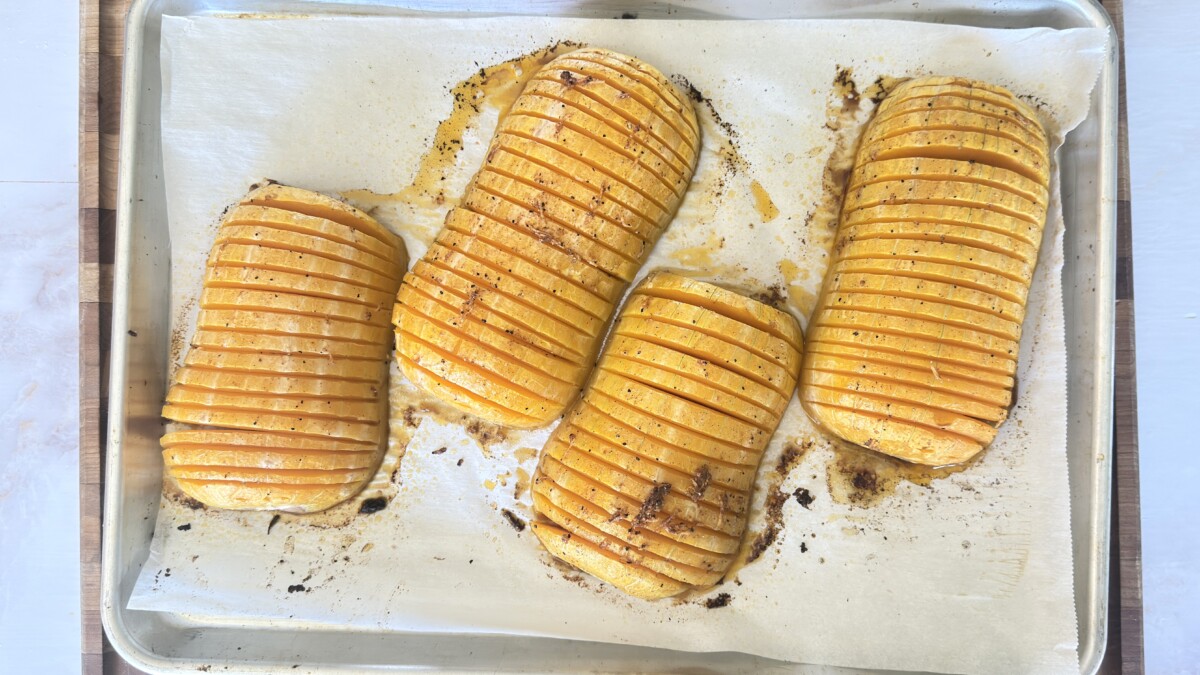
Prepare the Crispy Pancetta
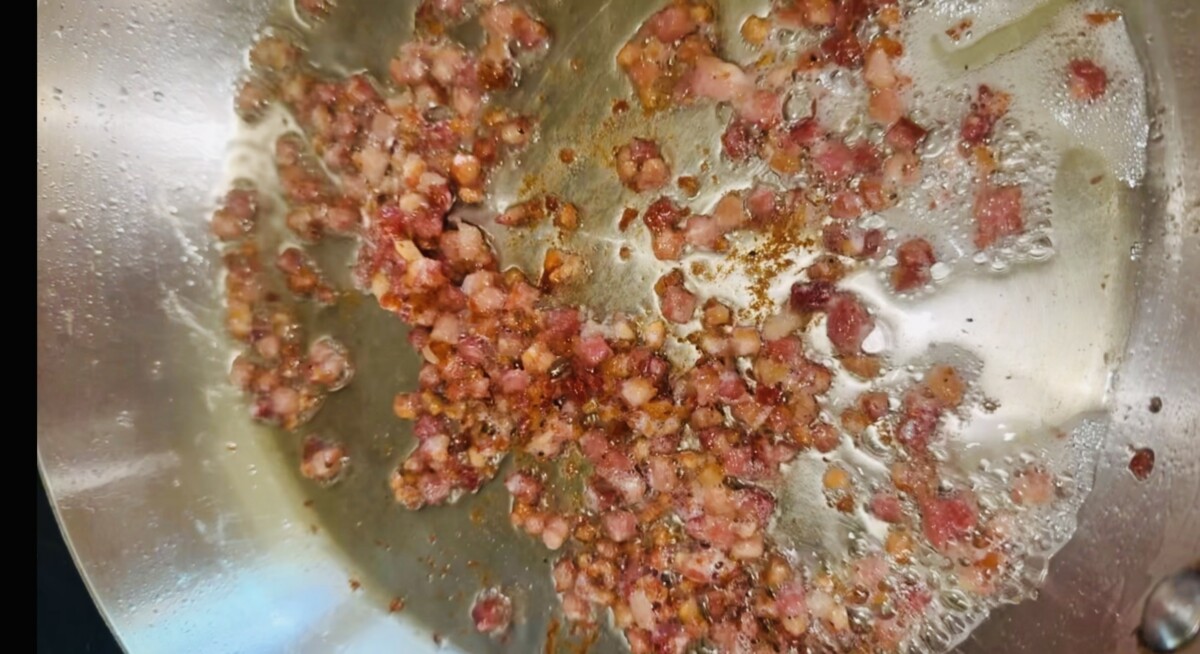
Leave those flavorful pancetta drippings right in the pan; we're going to use them to make the most incredible brown butter.
Make the Sage Brown Butter
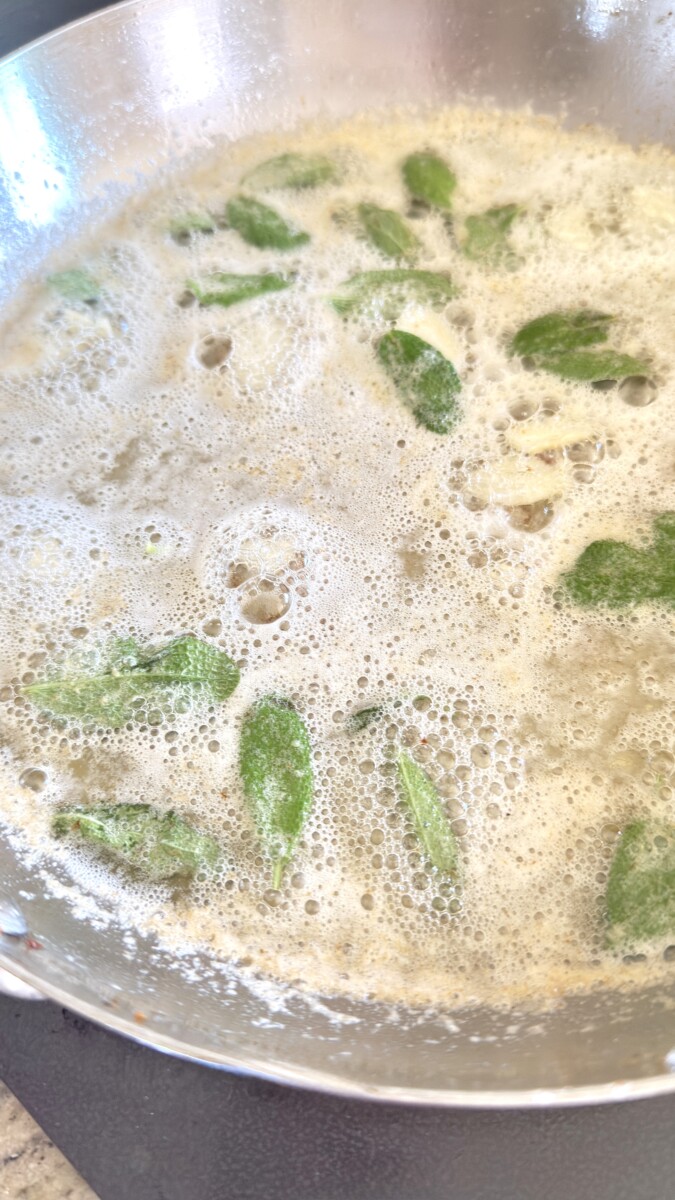
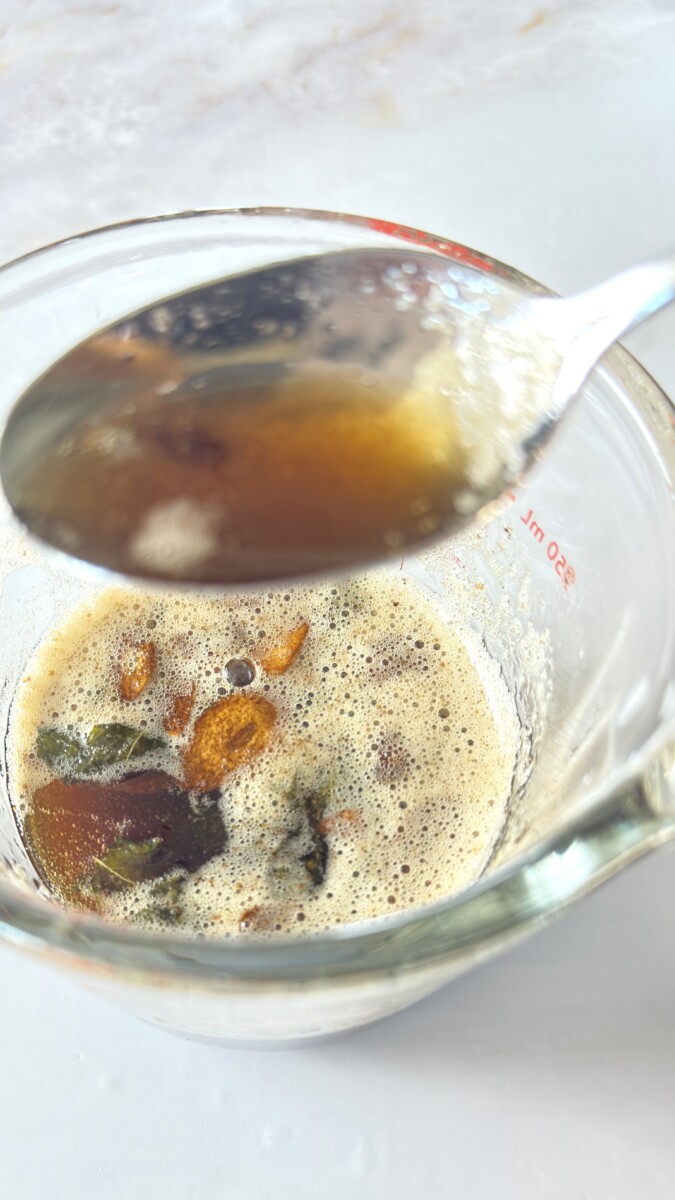
Remove from heat immediately when you see those golden brown flecks—brown butter can burn quickly, so watch it closely. Add a pinch of red pepper flakes.
Assemble and Serve

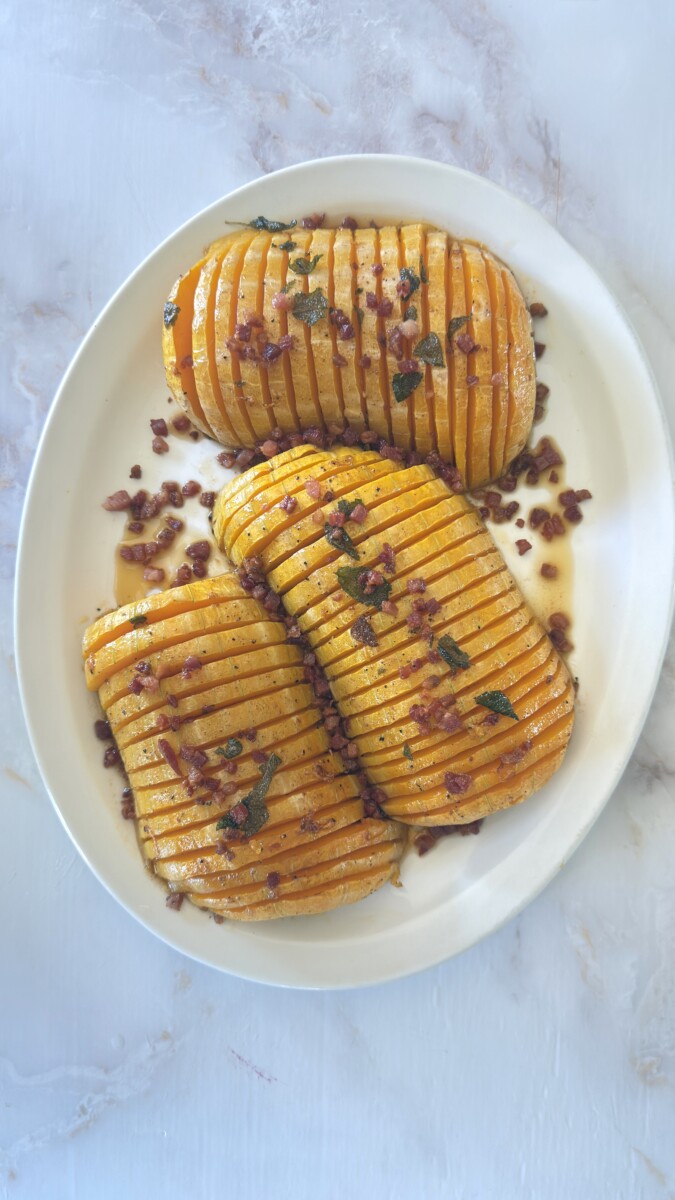
Transfer and garnish
Hasselback butternut squash roasted until golden and tender, drizzled with nutty sage brown butter, crispy pancetta, jewel-bright pomegranate seeds, and creamy tahini. This Mediterranean-inspired side dish is as delicious as it is beautiful—perfect for Thanksgiving and holiday entertaining.
Ingredients:
| 2 medium butternut squash (about 2-3 lbs each), peeled | |
| 3 tablespoons olive oil | |
| 1 teaspoon salt | |
| 1/2 teaspoon Apleppo Pepper or black pepper | |
| 1/2 teaspoon smoked paprika | |
| 2 garlic cloves, minced |
For the Sage Brown Butter
| 6 tablespoons unsalted butter | |
| 12-15 fresh sage leaves | |
| 2 garlic cloves, thinly sliced | |
| Pinch of red pepper flakes |
For Topping
| 4 oz pancetta, diced | |
| 1/4 cup pomegranate seeds | |
| 2 tablespoons toasted pine nuts | |
| 2 tablespoons pomegranate molasses | |
| 3 tablespoons tahini tahini, thinned with 1/4 cup of water and 1/2 of lemon juiced |
Preparation
Preheat your oven to 400°F (200°C) and line a large baking sheet with parchment paper. This prevents sticking and makes cleanup so much easier. Cut and hasselback your squash following the technique I described earlier in the "How to Cut Hasselback Butternut Squash" section. You'll have four beautiful squash halves with those accordion cuts. Remember to use the chopstick trick— I used metal straws, it really works! Pro Tip: If your squash is rolling around on the cutting board, place a damp kitchen towel underneath to keep it stable while you cut.
Make your seasoning mixture. In a small bowl, combine the olive oil, salt, pepper, smoked paprika, and minced garlic. Give it a good stir so everything is well combined. Brush generously. Using a pastry brush, brush the seasoned oil all over the squash—both sides. Don't be shy here! Make sure to get the mixture between those slices. Arrange on the baking sheet. Place the squash halves on your prepared baking sheet, cut-side up. Make sure there's a little space between each half so the air can circulate and they roast evenly.
Into the oven it goes! Roast for 50-60 minutes, until the squash is completely tender when pierced with a fork and the edges are golden and slightly crispy.
In a light-colored skillet over medium heat, cook the diced pancetta for 6-8 minutes, stirring occasionally, until it's crispy and golden brown. The pancetta will render its fat and become wonderfully crunchy. Using a slotted spoon, transfer the crispy pancetta to a paper towel-lined plate. It'll stay crispy while you work on the butter. Leave those flavorful pancetta drippings right in the pan; we're going to use them to make the most incredible brown butter.
With the pan still over medium heat, add the butter and let it melt. Once melted, add the fresh sage leaves and thinly sliced garlic. Swirl the pan occasionally for 4-5 minutes until the butter turns golden brown and smells nutty and toasty. The sage leaves will get crispy, and those garlic slices will turn golden. Remove from heat immediately when you see those golden brown flecks—brown butter can burn quickly, so watch it closely. Add a pinch of red pepper flakes.
Butter the squash. When the squash comes out of the oven, generously drizzle the sage brown butter right over the squash halves while they're still on the baking sheet. Make sure some of those crispy sage leaves and golden garlic slices land on top.
Using s wide spatula carefully transfer the squash halves to your serving platter. Drizzle the tahini sauce over the top in a decorative pattern. Sprinkle with the crispy pancetta, toasted pine nuts, and pomegranate seeds. and a few fresh sage leaves for garnish. Finish with a drizzle of pomegranate molasses for that tangy-sweet glaze. Serve immediately while hot.
Recipe Tips & Suggestions
Storing Leftovers
Reheating
Freezing
Nutrition Information
The information shown is an estimate provided by an online nutrition calculator. It should should not be considered a substitute for a professional nutritionist's advice.
See our full nutrition disclosure here.
Subscribe to my newsletter for authentic Mediterranean recipes, essential cooking tips, and the latest food news, all delivered directly to your inbox for FREE. Let’s create memorable dishes together!


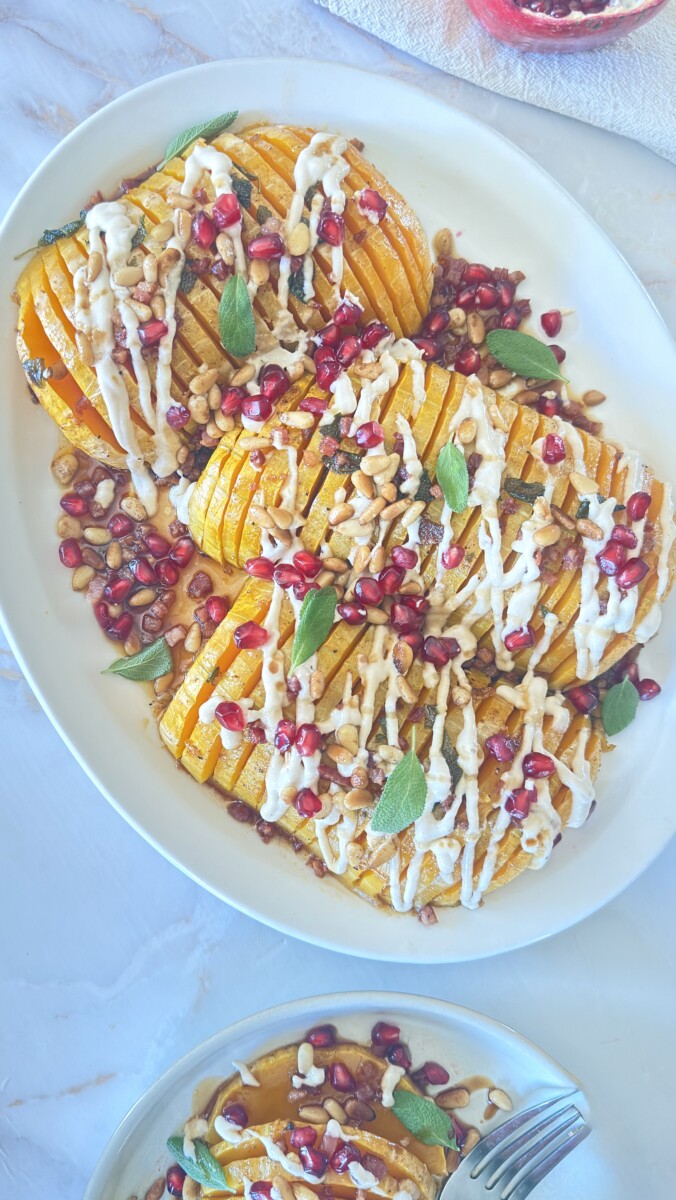


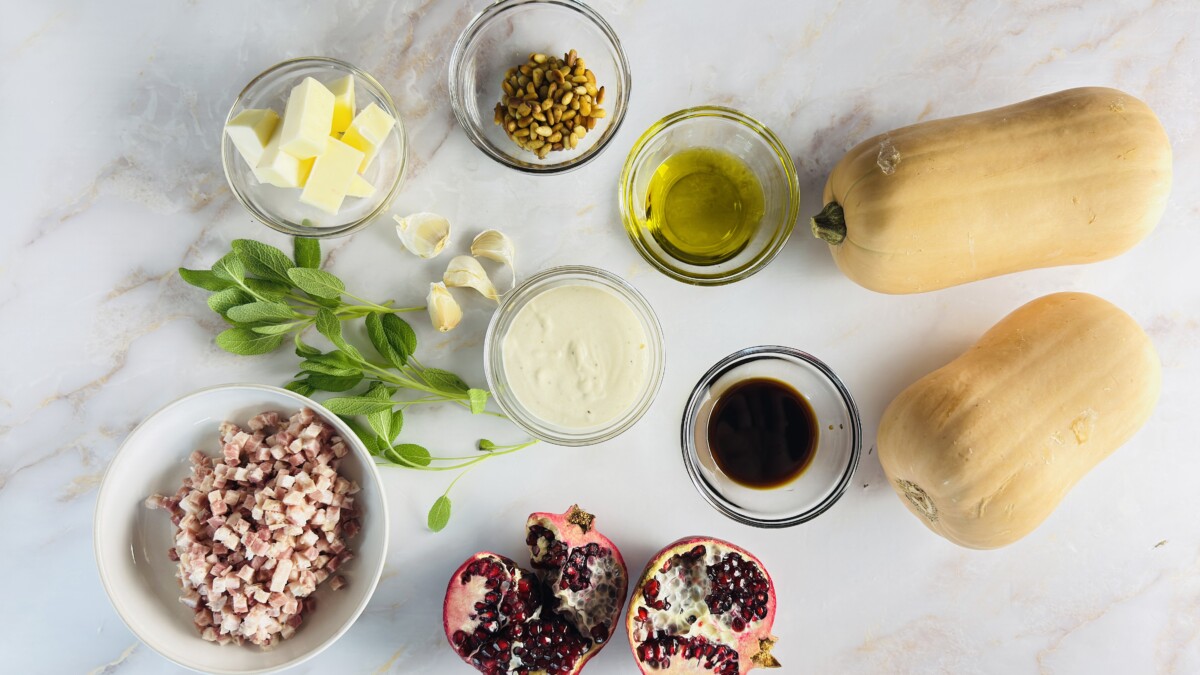

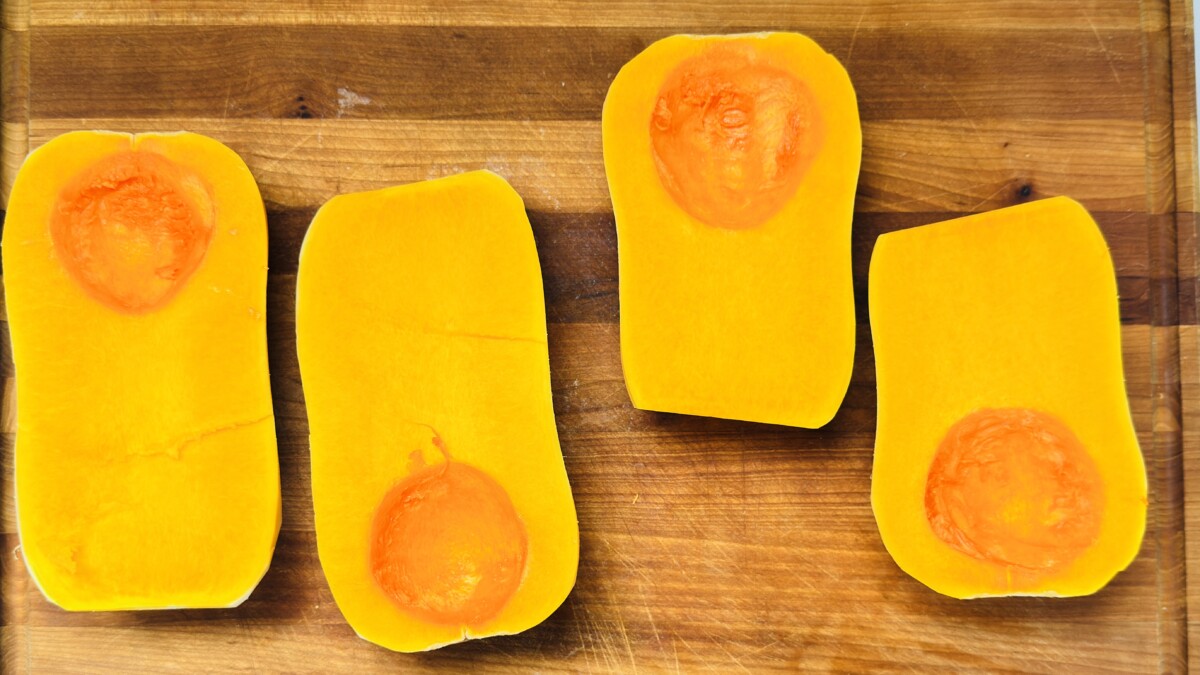
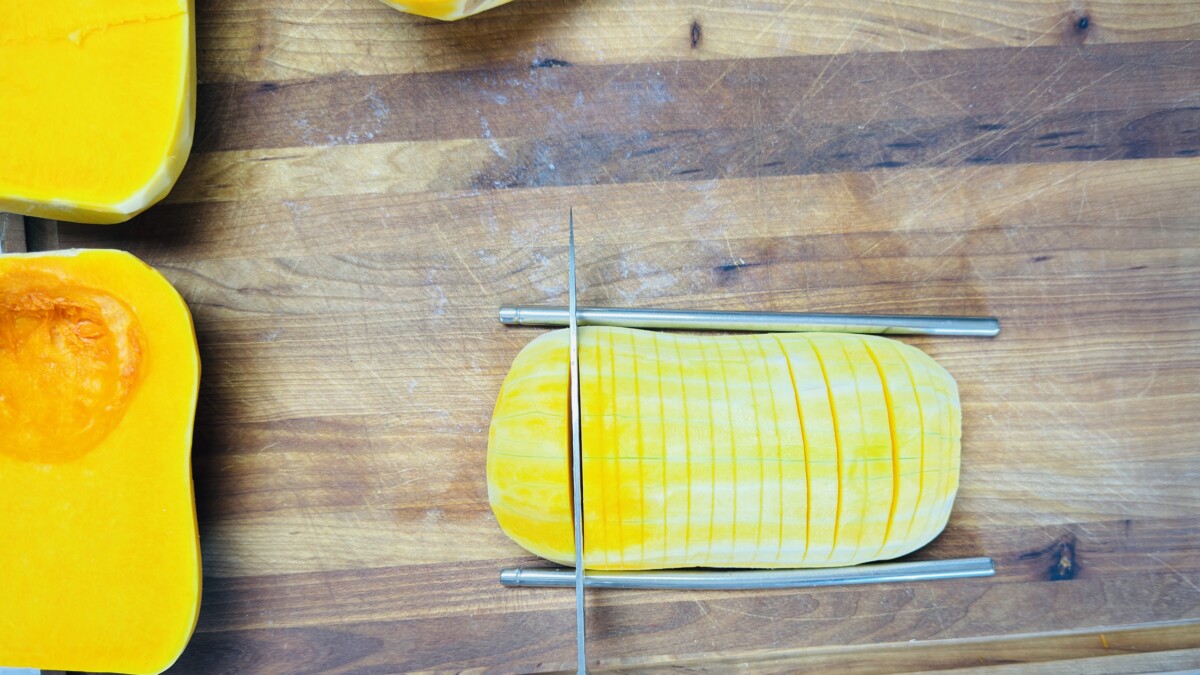


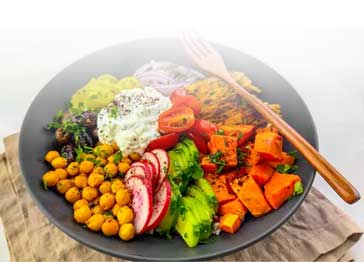
I’d love to hear how it turned out! Did you make this hasselback butternut squash for Thanksgiving? Did you try any variations or substitutions? Leave a comment below and let me know. Your feedback helps other home cooks, and I always love hearing what you’re making in your kitchen. Don’t forget to rate the recipe using the stars above—it helps others discover it too!